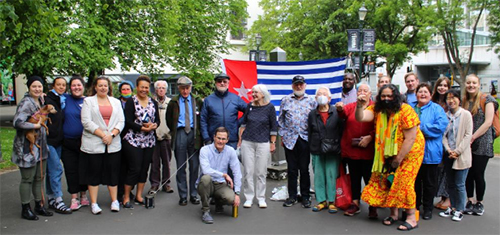https://www.odt.co.nz/the-star/showing-support-west-papua
Thursday, 8 December 2022
There are few actions more symbolic than raising the flag of your nation. Since antiquity, a simple piece of cloth swaying in the wind has sent a message of unity and common purpose. But for the people of West Papua, raising their national ‘Morning Star’ flag on December 1, 1961, was a short-lived experience, as only 19 days later Indonesia began to take control of the region which it still holds. Simon Henderson reports from Dunedin.
A flag-raising ceremony last week in the Museum Reserve was a show of solidarity.
West Papua Support Dunedin convener Barbara Frame said the group gathered each year on December 1 to raise the national flag of West Papua as a reminder of the first time the flag was flown in 1961.
The indigenous people of the region, formerly colonised by the Netherlands, were working towards self-government when instead it came under control of the Indonesian government.
After that, the people of West Papua were not allowed to fly their own flag, Mrs Frame said.

West Papua Support Dunedin members raise the West Papuan flag at the Museum Reserve last week.
Speaking at the flag raising, indigenous rights activist Sina Brown-Davis said over half a million West Papuans had lost their lives in their fight for independence.
"We must recommit ourselves to their freedom.
"Self-determination is unfinished business in the Pacific — self-determination is everything."
Author and explorer Dr Philip Temple said he visited West Papua in the early 1960s as part of mountaineering groups planning to ascend the Carstensz Pyramid.
Earlier this year, news of fighting in the West Papuan highland valley of Ilaga between Papuan rebels and Indonesian soldiers prompted "the kind of shock one usually feels at news of a death in the family or among friends", he said.
Some of the rebels had been killed.
"I was shocked because I felt that these were part of distant family and friends."
The Dutch had been administering West Papua as a province of the Netherlands and had been working towards it achieving independence when it was taken over by Indonesia, he said.
"The result has been the treatment of West Papuans as second-class citizens — and worse — and environmental destruction on a large scale, especially with the vast exploitation of the copper and gold deposits beneath the Carstensz Mountains."
Raising the flag of West Papua was a symbolic gesture of solidarity with its people, Dr Temple said.
"It is banned in its home country.
"It pains me that our government, with its declared support for indigenous peoples in the Pacific region and talk of decolonisation, does nothing for West Papuans, who live under the rule of a colonial power," Dr Temple said.
